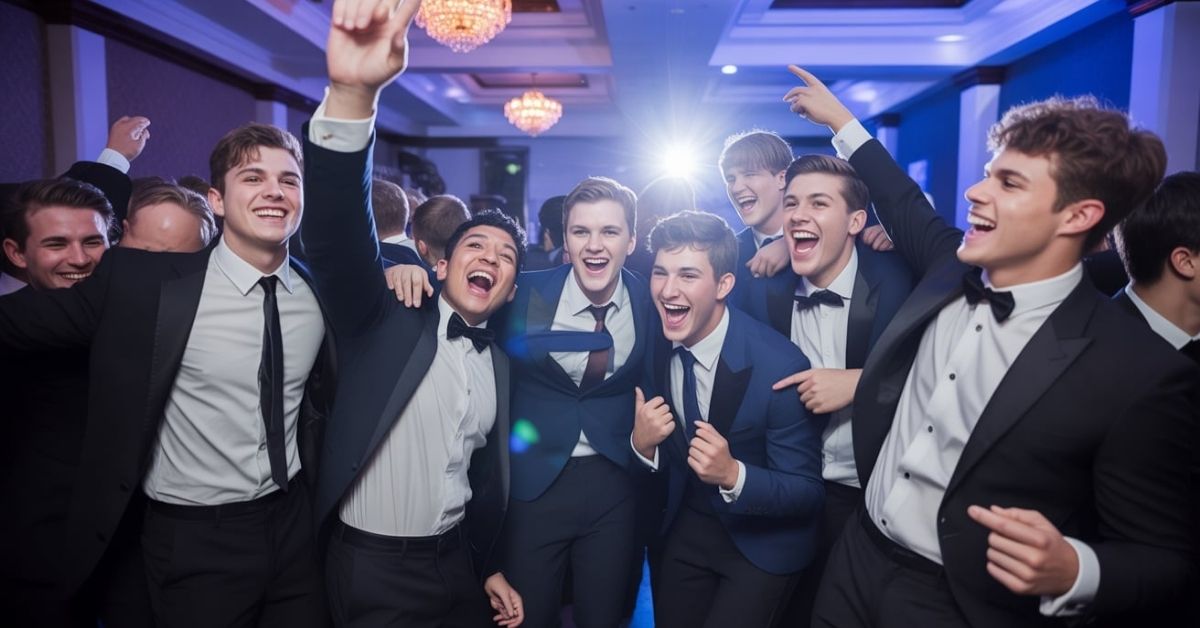Language is more fun when you add color to your words. That is why people love to use idioms for having a good time. These phrases bring energy to conversations and make them sound natural. Instead of just saying “I had fun,” Americans use creative expressions that paint a clear picture of joy. You can use them with friends, family, or even at work.
In this article, you will learn idioms for having a good time that people in the USA use every day. Each one shares a unique way to express happiness. Once you know them, your English will sound lively and full of personality.
Filtered Number Wise List
Having a Blast
When Americans say they are “having a blast,” they mean they are experiencing great joy and excitement. It is a phrase often used after attending a party, a concert, or a fun family gathering. Instead of just saying they had fun, people say they “had a blast” to emphasize the high energy of the moment. This idiom is very common across the USA, and you will often hear it in conversations among friends and coworkers when talking about their weekend plans or social events.
It shows more than simple enjoyment; it suggests a lively and vibrant mood. Someone may come back from a music festival and say, “I had a blast last night.” That single phrase immediately paints a picture of joy, laughter, and unforgettable experiences without needing extra details.
On Cloud Nine
Being “on cloud nine” expresses extreme happiness and delight. Americans use it when something positive has just happened, like winning a game, getting a promotion, or hearing good news from a loved one. The phrase itself creates an image of floating in the sky, surrounded by comfort and peace.
It is not just about fun but about deep emotional joy. For example, someone might say, “I was on cloud nine after hearing my college acceptance.” It connects to feelings of dreams coming true and is often used in both casual and emotional settings.
also reaide: 12 Customer Service Phrases to Use 8 You Should Avoid
Living it up
“Living it up” is about making the most of life, often in a luxurious or carefree way. Americans use it when traveling, celebrating, or enjoying experiences without worrying about responsibilities. Imagine someone on vacation in Las Vegas saying they are “living it up.” The idiom instantly conveys images of fun, excitement, and indulgence.
This expression is tied to adventure and enjoyment. It highlights how moments of joy can be maximized by stepping outside daily routines. For many people in the USA, “living it up” represents both freedom and happiness in the best possible way.
Paint the town red
When people in America say they want to “paint the town red,” it means they are ready to go out and celebrate in a big way. The phrase suggests nights filled with dancing, music, laughter, and excitement. It is often used before a group of friends heads out for a Friday night celebration.
The idiom is deeply rooted in American nightlife culture, representing joy and spontaneity. Saying “we painted the town red” tells listeners that the experience was energetic and memorable.
Having a whale of a time
This phrase means having an extremely good time, much larger than usual. Americans use it for vacations, family outings, or parties. The imagery of a whale, being one of the largest creatures, suggests that the joy is just as big.
For instance, someone might return from Disney World and say, “We had a whale of a time.” It captures the idea of overwhelming happiness and fun.
Tickled pink
When someone says they are “tickled pink,” they mean they are extremely delighted or pleased. In the USA, it often refers to moments of surprise or compliments that bring joy.
For example, receiving a thoughtful gift or hearing praise might make someone feel “tickled pink.” The idiom reflects warmth and genuine happiness.
Like a kid in a candy store
This idiom describes excitement and joy that feels uncontrollable, just like a child surrounded by endless sweets. Americans use it when someone is thrilled by choices, such as shopping, traveling, or exploring hobbies.
It suggests pure, innocent joy. Imagine a car enthusiast walking into a showroom and feeling “like a kid in a candy store.” That picture alone expresses total excitement.
Jump for joy
When something wonderful happens, people “jump for joy.” This phrase conveys happiness that feels physical, as though emotions are too strong to contain.
Americans often use it for moments of success, good news, or celebrations. For example, a sports fan may jump for joy when their team wins a championship.
Dance the night away
This idiom is often linked with parties, weddings, and nightclubs. It paints a picture of dancing, celebrating, and staying out late with friends or loved ones.
To “dance the night away” is not just about moving to music; it symbolizes freedom, fun, and being fully present in the moment.
Like a pig in mud
Although it may sound unusual, this phrase means being extremely happy and comfortable. In American culture, it’s a playful idiom often used in casual conversation.
Someone might say, “He was like a pig in mud with his new video game,” showing how deeply content they felt.
Having the time of your life
This idiom captures moments that stand out as unforgettable. Americans use it for vacations, concerts, weddings, or once-in-a-lifetime experiences.
When someone says they had “the time of their life,” it signals peak joy and lasting memories.
A barrel of laughs
This phrase means something or someone very funny. In American English, it often describes people who make everyone laugh in a group.
For instance, “That comedian is a barrel of laughs” means he brings joy and humor wherever he goes.
Walk on sunshine
To “walk on sunshine” expresses glowing happiness. The phrase is common in music, pop culture, and daily speech.
It means feeling light, joyful, and full of energy. For example, after falling in love, someone may say they are walking on sunshine.
Party animal
This idiom refers to someone who loves parties and social life. Americans often use it to describe extroverted friends who always bring energy to gatherings.
Being a “party animal” suggests endless enthusiasm and a love for fun.
Spread joy
The phrase means to share happiness with others. In American culture, it’s used in families, schools, workplaces, and community events.
Someone who spreads joy lifts people’s moods and creates a positive environment.
Let your hair down
When Americans say it’s time to “let your hair down,” they mean it’s time to relax and stop worrying. The idiom is often used after a stressful week.
It paints a picture of freedom and taking a break, often with friends or at a party.
Fun and games
This idiom describes playful activities but can also be used ironically. In casual speech, it often means enjoyment without seriousness.
However, it can also imply a warning, as in “It’s all fun and games until someone gets hurt.”
Joy ride
Originally connected to driving, “joy ride” now means enjoying something just for pleasure. Americans use it for both literal and figurative experiences.
It represents carefree fun, especially with friends or during adventures.
Laugh your head off
This idiom shows uncontrollable laughter. Americans use it when jokes or situations are extremely funny.
It conveys humor and joy so strong that words aren’t enough.
Having a field day

The phrase means enjoying something thoroughly. In the USA, media often use it to describe excitement or taking advantage of an event.
For instance, “The kids had a field day at the park” suggests they enjoyed themselves to the fullest.
Making memories
This idiom is about cherishing special times. Americans use it for family trips, holidays, and personal milestones.
“Making memories” connects to the idea of keeping moments alive through stories and pictures.
Enjoying the ride
More than just fun, this idiom symbolizes appreciating life’s journey. Americans use it to remind each other that experiences matter more than outcomes.
It’s about finding happiness in the process, not just the result.
Let the good times roll
This idiom is especially popular in the Southern USA, often connected to music and celebrations. It encourages people to enjoy life fully.
It represents joy, community, and carefree fun.
Feeling like a million bucks
This phrase describes feeling confident, happy, and full of energy. Americans use it after dressing up, recovering from illness, or achieving success.
It conveys both physical wellness and emotional positivity.
Having a field trip
While originally tied to school outings, in American English it can also mean going somewhere fun with friends or family.
It represents adventure, learning, and excitement.
Brighten your day

This idiom means lifting someone’s spirits. Americans use it for small acts of kindness, gifts, or good news.
A simple message or gesture can brighten someone’s day instantly.
Chilling out
This phrase is all about relaxation. Americans often say they are “chilling out” when watching TV, listening to music, or spending a quiet evening at home.
It conveys peace, comfort, and an easygoing mood.
Feeling on top of the world
When someone feels extremely successful or joyful, they say they’re “on top of the world.” It symbolizes high achievement and emotional satisfaction.
It’s commonly used after big wins, career achievements, or personal milestones.
Laughing all the way
This idiom describes happiness connected to both success and humor. Americans sometimes use it in a financial context, like “laughing all the way to the bank.”
It shows both prosperity and joy in one expression.
Happier than a clam
This phrase comes from coastal America and means being very happy. It suggests a natural, contented state.
People often use it casually to describe everyday joy.
Bursting with joy
This idiom describes overflowing happiness. Americans use it during emotional events like graduations, weddings, or the birth of a child.
It suggests joy so powerful that it cannot be contained.
Riding high
When people are successful or proud, they are said to be “riding high.” The idiom connects joy with confidence and accomplishment.
It’s often used in sports, business, and personal success stories.
Feeling like a rock star

This idiom means feeling confident, admired, and full of energy. Americans use it when describing moments of success, style, or celebration.
It symbolizes empowerment and joy, as though life itself is a stage.
Conclusion
You must remember that idioms for having a good time make your English sound fun and natural. These expressions must be used when you want to share joy. Americans must use them in daily talks, parties, and even at work. If you want to sound lively, you must learn them well. Each phrase must give you a new way to speak about happiness.
When you use idioms for having a good time, your words must feel alive. You must practice them with friends and family. These idioms must help you connect better with people. They must also make your conversations full of joy.

Grammerroot is your trusted source for mastering English grammar and language skills. From simple rules to advanced tips, we help learners build strong foundations through easy-to-understand content. Learn smart, learn right — only at Grammer Root.




